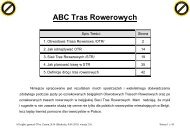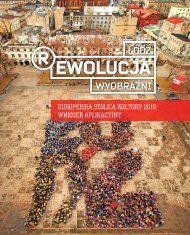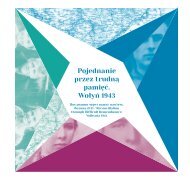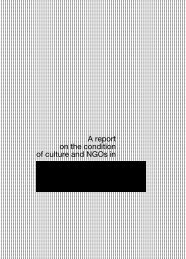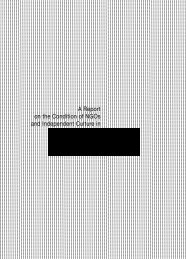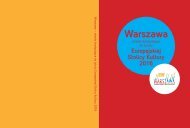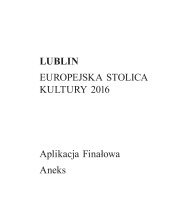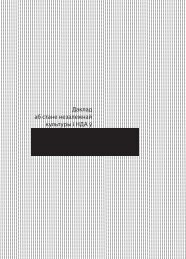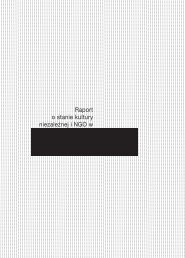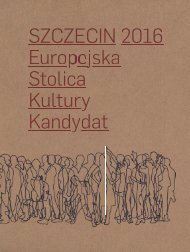Lublin 2016 â Appendix - Kultura Enter
Lublin 2016 â Appendix - Kultura Enter
Lublin 2016 â Appendix - Kultura Enter
You also want an ePaper? Increase the reach of your titles
YUMPU automatically turns print PDFs into web optimized ePapers that Google loves.
and freely available, arranged thematically and tailored to target groups - is a prerequisite for the<br />
awakening of potential “consumers’” interest in the cultural offer. This system should be open to<br />
all operators and organizers of cultural, social and sports events, etc., and allow efficient scheduling.<br />
It should also facilitate access to information in general and the purchase of event tickets in<br />
several much frequented city locations (stations, airport, city centre, shopping centres). The on-line<br />
support for this system should coincide with traditional solutions, expanding the availability of<br />
information and facilitating the use of the offer.<br />
4.3 To offer child care in cultural establishments - to enable parents of small children to participate<br />
in culture; child care may occur simultaneously with artistic education of children.<br />
4.4 To provide support to impecunious persons wishing to participate in culture, or deserving<br />
assistance for other reasons - this objective will address, besides promoting free cultural offer, a<br />
ticket subsidy scheme, or reimbursements for other charges related to participation in culture. In<br />
addition to public support (limited by law), it is possible to launch or develop private sponsorship.<br />
4.5 To facilitate access to culture to persons and groups from outside <strong>Lublin</strong> - this objective aims<br />
to synch bus timetables with cultural events for audiences from the region and from locations within<br />
three hours’ drive from <strong>Lublin</strong>. It will also apply to organized trips, tourist stays, conferences<br />
and symposia that would include cultural events in their programmes and itineraries. What<br />
follows, foreign language tourist information and signage should also be put in place.<br />
4.6 To eliminate architectural barriers in cultural sites, historic buildings and sports and recreational<br />
facilities.<br />
4.7 To develop a system of tourist information - including the information signs and signage indicating<br />
ways of access to historical and cultural locations and public toilets, as well as guides and<br />
printed material about historic monuments (including multimedia). This system should not overlook<br />
multilingual media and Internet communication and promotion of <strong>Lublin</strong> outside the city.<br />
Cultural Development<br />
Strategy<br />
5. Cultural governance<br />
this area needs urgent improvements. The existing management structures established for much less<br />
extensive cultural activity have spared no effort in recent years to handle this constantly growing scope<br />
of responsibilities. In order to implement the programming and operational objectives, it is mandatory<br />
to pioneer more efficient methods of cultural management, capable of supporting more cultural<br />
operators and culture participants. This will entail the simplification of procedures in culture organization<br />
undertaken by such operators. Openness and transparency of governance are mandatory in socializing<br />
participation in culture and developing civic attitudes. Besides the governance ideas described<br />
below, due to the evolving management quality standards, it will be necessary to gradually integrate<br />
cultural governance with other “sectors” such as education, restoration and revitalisation of historic<br />
sites, development of green areas, sport and recreation, urban ecology and regional policy. All these<br />
provinces of human activity are interdependent and together determine the quality of life in the city.<br />
The operational objectives set out in this area are:<br />
5.1 To ensure comprehensive monitoring and evaluation of cultural phenomena - this goal will be<br />
pursued by the <strong>Lublin</strong> Cultural Observatory (Pol. LOK) established under an agreement between<br />
the municipal authorities and local universities as an independent research structure; it will guarantee<br />
an objective approach and reliability of gathered data, as well as sharing expert opinions<br />
with all entities involved in cultural management; in parallel, the LOK will be developing its original<br />
cultural research methodology (2.5), as appropriate. The establishment of the LOK with a<br />
well-devised research programme will ensure adequate monitoring of the progress, implementation<br />
and impact of ECC <strong>2016</strong> for at least 10 years, with the option of tracking relevant outcomes<br />
in the short, medium and long term. One of the LOK’s tasks will be to propose programmes and<br />
81



